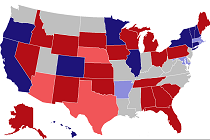Cuba: end of isolation
The U.S. has finally ended its outdated policy of isolating Cuba. It is a triumph for the proud and courageous Cubans who have withstood so many overt and covert destabilisation attempts by the U.S. It is also a victory for Latin America which has opposed the U.S. embargo and advocated normalization of relations with Cuba










